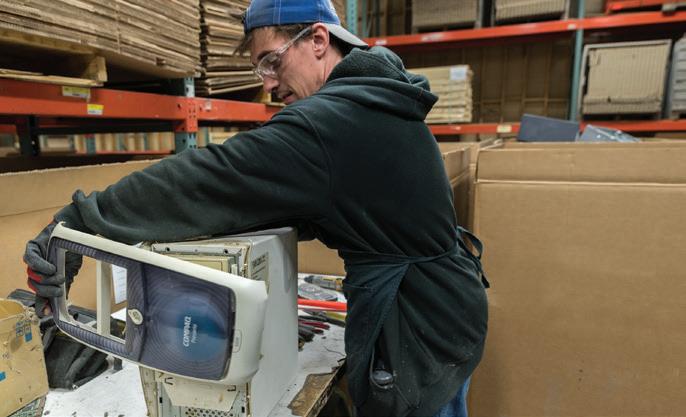
3 minute read
Black Hills Works and Western Dakota Tech partner to offer an Electronics Recycling Solution
By Black Hills Works
A unique new partnership has revitalized EchoWorks, an electronics recycling program that is part of Black Hills Works, a Rapid City-based nonprofit organization supporting nearly 600 adults with disabilities.
In operation several years ago, the program costs and a downturn in prices for recycled metals and other commodities made the program unsustainable at the time.
EchoWorks is now located on the Western Dakota Tech (WDT) campus and utilizes students in key aspects of the program, which greatly reduces operational costs. This innovative collaboration, and its environmental impact, was applauded by the Black Hills Area Community Foundation which awarded Black Hills Works its $50,000 Community Action Grant last fall. More recently, EchoWorks also received a $10,000 Community Innovation Grant from the South Dakota Community Foundation.
“We are delighted to welcome EchoWorks and its employees to our campus,” said Dr. Ann Bolman, President of Western Dakota Tech. “EchoWorks is providing an e-recycling option in our community and it is offering our students unique career building experiences that augment our instruction very well.”
WDT students have already been called upon to assist with developing marketing materials for the project, even creating some conceptual Public Service Announcements.
“My students were tasked with coming up with the environmental impacts of e-waste and then put that knowledge into 20 second videos,” said Dr. Kelsey Murray, Program Director for WDT’s Environmental Engineering program. “It’s not easy to explain in soundbites the harm that e-waste does to our environment; they did a great job.” Most instrumental, however, will be help from the college’s trucking students. By law, the Rapid City landfill cannot accept electronics for disposal or recycling, even to hold for EchoWorks. Under the new partnership, trucking students will haul the recyclables to Wisconsin, one of the nearest facilities to accept e-waste, giving them valuable experience in gaining permits and hauling across state lines.
“Most consumers don’t realize they can’t just take their old electronics to the landfill,” said Dr. Andrea Serna, President of the Black Hills Works Foundation. “EchoWorks is checking several boxes for our community. It’s an employment opportunity for people with disabilities, who will be interacting daily with students, joining them on work breaks and eating at the student commons. It’s also a recycling solution for people living in Rapid City and throughout the Black Hills who don’t know where to go with their old electronics.”
EchoWorks has been open for business since January 1, 2020, its “soft launch.” Consumers and businesses have already dropped off old laptops, desktop computers, cell phones, office phones, flat screen monitors, flat screen televisions (not analog televisions), printers, copiers, fax machines, cords and other items. EchoWorks is also able to shred hard drives to ensure privacy, offering a certificate of destruction.
EchoWorks wants consumers to know in advance that they will be charged a fee for most items to accommodate the cost of doing business.
“There is the misperception that everything electronic is recyclable and that recycling is free,” said Dr. Serna. “There are business costs. Our employees earn fair wages to help with disassembly and the recycling facility charges us. There is a demand for e-waste recycling in Rapid City, so we expect that consumers will be willing to pay a modest fee for having us take old computers, laptops and flat screen monitors off their hands, while also helping to employ people with disabilities.”
To find out more about what EchoWorks recycles and associated fees, visit blackhillsworks.org/whowe-are/our-affiliates/e-cycling or call 718-3000.
“Black Hills Works is grateful to the Black Hills Area and South Dakota Community Foundations for their support in making EchoWorks possible for the people we support and our community, and to Dr. Bolman for welcoming us to her campus,” said Dr. Serna. “We are delighted to be working with Kelsey and her students to raise awareness about the importance of environmental sustainability in our community by making e-recycling a reality.”





